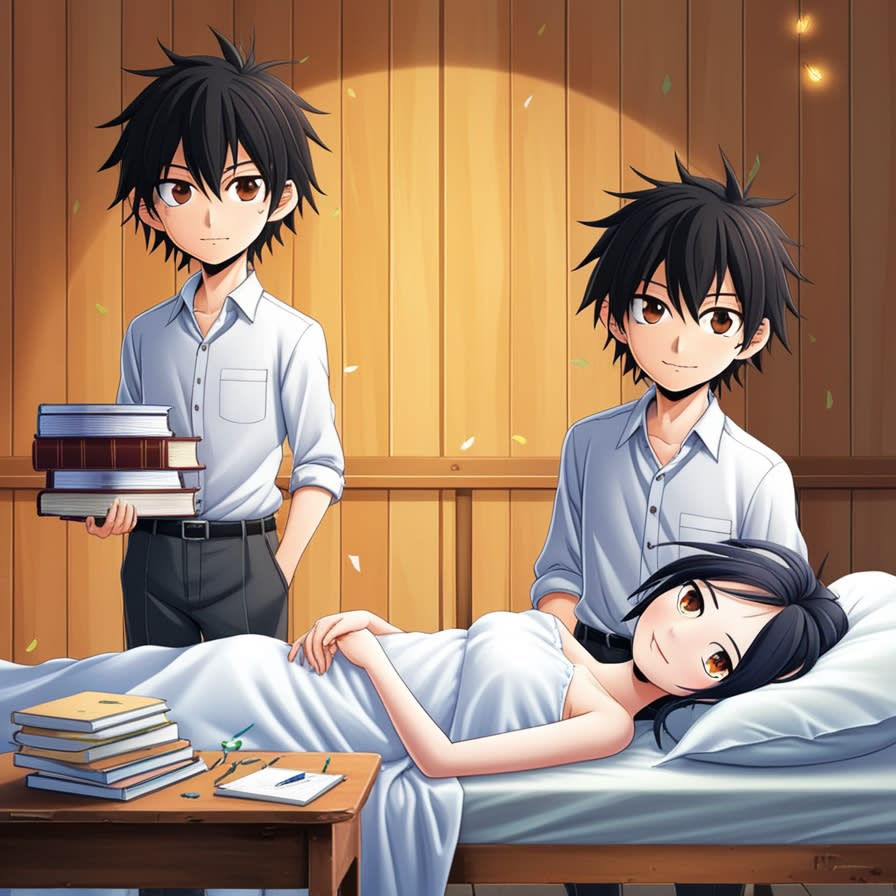I read 'Too many clones' by Marcelo Leite
Today I finished reading ‘Clones Demais’, by Marcelo Leite. This is another children’s book that I discovered through the literary fridge. This book, however, has a greater focus on science and, during the reading, we come across “more technical” terms. The positive point is that the meaning of these terms is presented on the same page, making it easier to understand.

The Exchange of Identities and the Beginning of Problems
The story begins with two identical twins, or univitellines. Because they are like this, they take advantage of their similarity to switch places (something I would certainly try if I had one!). Their names are Francisco and Tiago, and Tiago starts to like Suzana, but he knows that Suzana has a “crush” on Francisco, and tries to get closer to her by “being” Francisco. But Suzana ends up discovering Tiago’s deception (I don’t remember how she finds out). Tiago apologizes, but Suzana asks for a week to make up her mind.
Suzana’s Illness and the Unexpected Proposal
During this period, Suzana falls ill, and this is where the main plot unfolds. Her parents, seeing their daughter bedridden, consult several doctors (Suzana’s father is also one of them). Without success, they decide to go to a clinic specializing in reproduction, which coincidentally belongs to a college friend of Suzana’s father. According to Suzana’s father, this friend has always had opinions that “violate” medical ethics.
This doctor suggests creating a clone of Suzana, using genetic material from her father, with the aim of obtaining organs and stem cells with a higher compatibility rate. Suzana’s father leaves the clinic distraught and needs to be calmed down by his wife. They both decide to talk to Suzana before making any decisions, especially something that directly involves her.
The Dangerous Investigation
As the story unfolds, Suzana’s condition worsens (the relationship with the clone issue remains unclear to me). Tiago remains close by, visiting her daily (after all, he wanted to date her), but this situation makes his studies and visits a little difficult. The twins then decide to resume the scheme of swapping places. On one of these occasions, Francisco discovers the story of the clones through one of Suzana’s delusions, which talked about her sleeping clone, and tells his brother Tiago everything.
The creation of clones is prohibited in Brazil and in much of the world. As the story progresses, the boys and their sister (a biology student, whom they consult to decide what to do) decide to investigate the clinic in search of evidence that similar procedures have already been performed. That way, they could file a complaint, if necessary.
My Impressions on the Characters’ Attitude
During the investigation, Tiago and his sister end up being arrested in the clinic building and reveal everything they know when they are discovered.
What did I think of this part of the book? Absurd! To me, they would at least compromise Suzana’s father’s relationship with the clinic’s doctor, which was already not the best, and this situation could get even worse.
Not to mention the problems this could cause for the clinic itself. Since they had no concrete evidence, if the story about the clones was not true, they could seriously damage the company’s reputation. I don’t know, to me, this would be very risky.
It seems like the boys simply went there and the rest can go to hell. In addition, they caused damage, as they ended up breaking one or more things in the place.
An (Almost) Happy Ending
But at the end of the book, Suzana’s condition improves and cloning is no longer necessary, and from what I remember (it’s been a few days since I read it, at the time of writing this post), Tiago is able to date.
In Conclusion: A Scientific Reflection for Children and Young Adults
My conclusion is that this is a book that addresses a relevant topic related to science, with an even greater focus on medicine, biology, and cloning.
It’s a good book, because it mentions real cases such as that of the first cloned dog and that of the veterinarian Hwang Woo-suk, who became known for supposedly cloning mammals (such as Dolly the sheep). I was unaware of these cases until then, and this is one of the great benefits of reading: it encourages us to investigate further the topics addressed, even in science fiction and children’s books.
Finally, I recommend this book to anyone who is curious and interested in scientific topics.
Back to the posts here